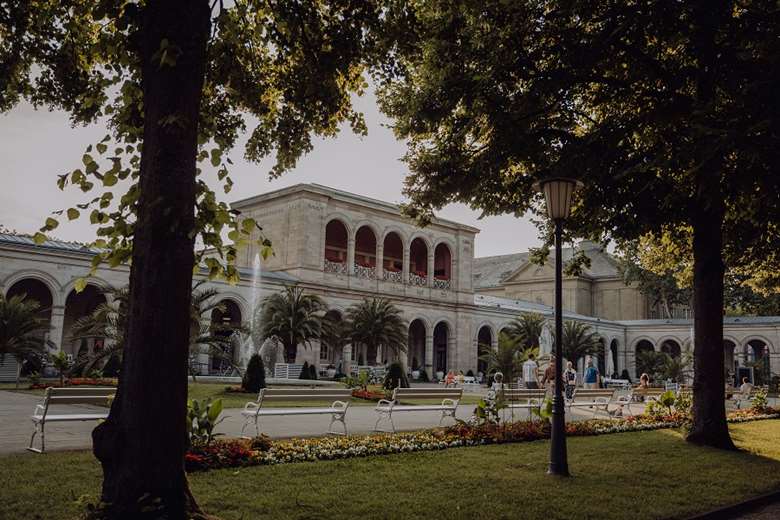Shifting the focus at Kissinger Sommer festival
Simon Mundy
Thursday, July 13, 2023
Simon Mundy explores the Northern Bavarian festival's offering and chats to new intendant Alexander Steinbeis about his vision for the festival's future

Nestled in the green rolling hills of Northern Bavaria, closer to Frankfurt than Munich, is a spa town of only 20,000 people that became highly fashionable with German royalty in the middle of the 1850s – and with musical royalty too. Rossini spent months there being treated for the 'sins of my old age' and the experience prompted him to start composing again after a quarter of a century, giving his works that name. The name of the town, Bad Kissingen, does not work well in English which might explain why its modern elderly adherents are almost exclusively German, but since the 1980s it has been the location for one of the country's most distinguished music festivals.
The programme runs for over a month, but I was able to spend four days there at the end of June. Since Covid struck the Kissinger Sommer festival has had a new intendant, only its third since the first festival in 1986, who is very different in style and approach from his predecessors. Alexander Steinbeis (pictured below) is anything but an inward-looking Bavarian. Educated in England (Sevenoaks School and the London School of Economics) he had internships at the Théâtre de Champs Elysées in Paris and with the Boston Symphony Orchestra, where he stayed in the management team for seven years, working with Seiji Ozawa and James Levine and particularly relishing his summers at Tanglewood.
 ©Julia Milberger
©Julia Milberger
Steinbeis went back to Germany in 2005, heading to Berlin to take over the Deutsche Symphony (DSO) which had emerged from the cold war era RIAS Orchestra. After a short stint as the main programmer, by 2007 he was in complete charge and stayed with the orchestra until 2018, by which time he had eased Robin Ticciati into the post of principal conductor. In Bad Kissingen he inherited two fine concert halls of the traditional sort (the larger Max Littman Saal a gorgeous wood-panelled room with 2,000 seats) amid the spa complex and gardens – his office in the building converted from the Turkish baths in which Rossini tried to steam out his infections. He also inherited municipal backing that massively transcended the town's size, showing the sort of generosity that Bavaria has always invested in its artistic life and that would make the British equivalents green with envy.
'The recipe used to be about mixing big names with interesting newcomers who became famous later,' says Steinbeis, 'perhaps more about names than programmes but that's shifted now and we are less focussed on names.' Summer music has always been important for the spa, giving relief from the more uncomfortable treatments. In the years before the First World War, the Vienna Symphony spent months there in the way that the London Philharmonic inhabits Glyndebourne, and it provided welcome employment for the musicians of Bohemia.
Steinbeis has been keen to expand the programmes beyond the traditional: 'taking the music out of the temples so that it is more present in the city, outdoors, with more involvement from local groups and the visitors themselves. For example, last year Kent Nagano came and augmented the DSO with an amateur scratch orchestra so that we had a mixed ability group of over 700, everybody who could standing and performing either original or simplified parts'.
Over the long weekend I was able to spend there, that philosophy was clear. Schoolchildren played percussion in a rose garden by the river, others sang in the acoustic shell on the outside of the mineral water spring's emporium and on one wild evening Kristjan Järvi had the elderly patrons dancing in the aisles as he led them and the Baltic Sea Philharmonic in a sort of shaman dances jam session. In between there was some more rigorous music-making. Leif Ove Andsnes gave a challenging recital in the hall bearing Rossini's name, as did two young pianists who have made interesting starts to their careers in Britain – Lauren Zhang (a section winner in BBC Young Musician of the Year) and Ariel Lanyii (who did well in the Leeds competition). Less convincingly Anne-Sophie Mutter led her hand-picked ensemble of modern instrument string players in Vivaldi and Bach, though superbly in her former husband, Andre Previn's Nonett. Beatrice Rana gave her customarily imaginative reading of the Schumann Piano Concerto.
Delightful as they are, small spa towns can get claustrophobic, and the most enjoyable concerts of the weekend took place a few miles outside the town in the countryside setting of the Maria Bildhausen former nunnery complex. On the Sunday in its ancient and resonant hall there were two chamber concerts with lunch on the lawns in between. In the first an impressive trio comprising violinists Francesca Dego and Mulena Simovic plus cellist Laura van der Heijden played, among other things, a lovely work by Previn's teacher Mario Castelnuovo-Tedesco, his Op. 147. And in the afternoon the Quatuor Modigliani relaxed us in Puccini's Crisantemi then were joined by two others to wake us up properly with an exceptionally vigorous performance of Tchaikovsky's Souvenir de Florence. The Kissinger Sommer festival is something of a Bavarian secret at the moment. More international audiences need to descend on the town to discover what the players seem to have known all along.



